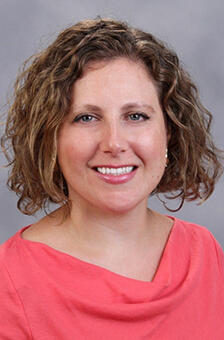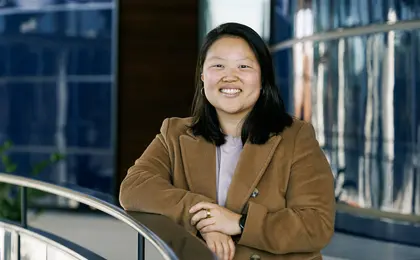Assistant Dean Abigail Kies Answers Frequently Asked Questions about Careers
Kate Botelho, associate director of admissions, talks with Abigail Kies, assistant dean for career development, about virtual recruiting, switching careers, and how to identify the right path and stay on it.
Kate Botelho: I think one thing that is on prospective MBA students’ minds right now is the changes to the recruiting process over the last year. What is the CDO doing to prepare students for virtual recruiting? And what do you think some of the advantages and disadvantages have been for students this year?

Abigail Kies: Being prepared for recruiting is as important as ever in this virtual environment. There isn’t that much that’s different when you really get to the heart of it, though. Students need to be clear on their goals and be able to articulate their value and how they’ll contribute, in writing and in conversation. They need to be able to connect with alumni, recruiters, and other employer representatives and let people get to know them.
Since all of our workshops and coaching are virtual too, the virtual element is integrated into all the preparation we’re doing. For instance, this year workshops on networking and interviewing as well as individual mock interviews were all done virtually. We’ve also developed and continue to expand specific workshops and strategy sessions on standing out in virtual recruiting—how do you build authentic relationships with people you aren’t meeting in person? What are the opportunities you have now that you might not otherwise? How do you leverage these? Something else we’ve done is partner closely with employers to create a variety of types of events for students—some larger activities with networking components, others smaller and more interactive.
There are many advantages to this virtual recruiting model. Students at all schools across the globe have more access to employers, regardless of location. That flexibility lets more students choose and focus based on their values and goals, not ease of access, which leads to better outcomes for everyone. Another related benefit is saving on travel cost and time. Quality interactions with employers can occur any day and take less planning.
Botelho: As you know, many of our students are career switchers. In admissions, we find that students are nervous about discussing this pivot in their applications; I imagine that they are also wondering what the process will look like for them once they are actually recruiting. What are some things students can do to prepare for a career transition in an MBA program?
Kies: Explore, research, talk to people, and ask tons of questions! It’s great to use the spring before business school to learn about what’s out there—most people know so little about what careers exist, and now is the time to expand that. The more exploring you do before you arrive at business school, the more you’ll make of your time at Yale SOM. Ideally, students should narrow down their goals (target industries and functions) to less than three possibilities before they arrive. These may change as you’re exposed to classes, speakers, classmates, etc., but it’s important to have a stake in the ground as a starting point.
Keep in mind that it’s very tough to change your industry, function, and geography all at once. What are your priorities? Talk to your friends, parents’ friends, colleagues in other departments, clients—anyone you can, really. Notice what draws your attention when you’re reading the news, or what blogs you find interesting. What are the post-MBA careers that might be related? Read about careers, top employers, and interviews with recent alumni. Listen to the Yale SOM Career Conversations podcast—it’s a great way to learn firsthand from students and alumni about their career journeys and choices. It will also give you ideas of questions to ask as you speak with people in your life about what they do.
Botelho: I talk to students all the time who want to come to Yale, especially because of the mission and diversity of the school, and are interested in pursuing a nontraditional career path. One thing that they are all concerned about is getting swept up in some of the more structured recruiting paths. What advice do you have for students pursuing nontraditional pathways? How does the CDO support them in their pursuit?
Kies: I always cringe at the idea of “traditional versus nontraditional” MBA career paths. One great thing about an MBA is the endless career possibilities it can lead to. Large employers that hire many MBAs each year tend to have the more structured processes, and Yale SOM students are very successful at recruiting with those employers. However, many Yale SOM students continue to opt for a variety of employers across industries, geographies, and organization size. You’ll find that over half our students ultimately accept offers from “unstructured” processes—and that Yale SOM students care deeply about their careers and the impact they’re making, regardless of their chosen industry or function.
The clearer you are on what that means for you, the easier it will be to stay committed to your personal goals. Most students benefit from working closely with our coaching team to devise an individual strategy. To support this process, before classes begin, the CDO hosts a series of more than 15 alumni Career Immersion panels, introducing students to global alumni working in well-known industries and organizations, as well as more obscure ones. Throughout the year, we coordinate additional events, including multi-employer networking events, which are ideal for smaller employers, and ExploreSOM events, small informational conversations coordinated by the CDO in industries that tend to hire later in the year.
Another important source of support: get involved with student clubs focused on the industries that interest you.


